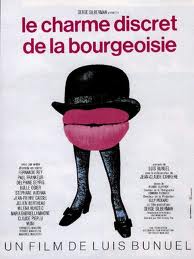The Discreet Charm of the Bourgeoisie is a surrealist film directed by Luis Buñuel. The history is about a group of people (bourgeois) trying to dine together. Even though they are constantly interrupted by different kind of events and can´t have dinner, they continue attempting and trying to dine together. This is the main point of the movie, that´s the whole story; it may sound really stupid, but it’s an excellent satire of bourgeois and their way of life.
 It is difficult to identify the “Freytag´s Pyramid” in this story, especially because it´s a surrealist film in which the line between reality and dreams is very thin. The exposition is the beginning of the movie when the Thévenots, Rafael Acosta and Florence arrive to the house of the Sénéchals, in order to have dinner. In this part the characters are introduced and there is some information provided about them, also, there is an initial conflict or inciting incident, when Alice Sénéchal (host of the dinner party) tells the guests that she was expecting them the day after, so she has no dinner prepared.
It is difficult to identify the “Freytag´s Pyramid” in this story, especially because it´s a surrealist film in which the line between reality and dreams is very thin. The exposition is the beginning of the movie when the Thévenots, Rafael Acosta and Florence arrive to the house of the Sénéchals, in order to have dinner. In this part the characters are introduced and there is some information provided about them, also, there is an initial conflict or inciting incident, when Alice Sénéchal (host of the dinner party) tells the guests that she was expecting them the day after, so she has no dinner prepared.
Finally, I don’t think there is a turning point or a resolution; because there is no problem solved in this story, we can even see in one of the last scenes the six main characters walking in a deserted road, resembling that they are going nowhere. As I said before, it is difficult to identify ideas because there are some disconcerting dream scenes (one of Buñuel´s specialty).
 It is difficult to identify the “Freytag´s Pyramid” in this story, especially because it´s a surrealist film in which the line between reality and dreams is very thin. The exposition is the beginning of the movie when the Thévenots, Rafael Acosta and Florence arrive to the house of the Sénéchals, in order to have dinner. In this part the characters are introduced and there is some information provided about them, also, there is an initial conflict or inciting incident, when Alice Sénéchal (host of the dinner party) tells the guests that she was expecting them the day after, so she has no dinner prepared.
It is difficult to identify the “Freytag´s Pyramid” in this story, especially because it´s a surrealist film in which the line between reality and dreams is very thin. The exposition is the beginning of the movie when the Thévenots, Rafael Acosta and Florence arrive to the house of the Sénéchals, in order to have dinner. In this part the characters are introduced and there is some information provided about them, also, there is an initial conflict or inciting incident, when Alice Sénéchal (host of the dinner party) tells the guests that she was expecting them the day after, so she has no dinner prepared. Many things happened after this, they go to a little inn to have dinner, but they can´t because the manager died some hours before, they also tried going to a tea house where they were out of beverages, also in the Sénéchals, but they don’t arrive because they run and have sex in their garden instead of joining their friends. These events can be considered as the climax because it is the most important part of the movie; there appear soldiers and a bishop that represent the military and cultural power they had during dictatorships, even though they appear to understand the hypocrisy, corruption and prejudice in which they lived.

No hay comentarios:
Publicar un comentario